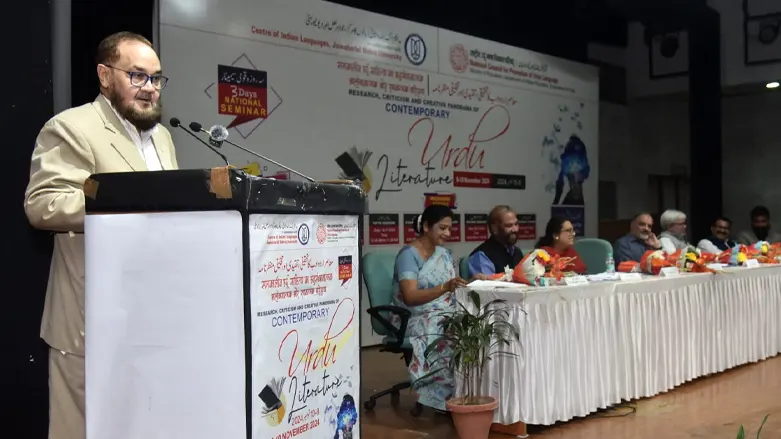- National Urdu Council has made significant contributions in promoting both language and literature: Dr. Shams Equbal
- Literature is born out of its era and society: Syed Muhammad Ashraf
New Delhi: A three-day national seminar has been inaugurated under the auspices of the National Council for Promotion of Urdu Language (NCPUL) in collaboration with the Centre for Indian Languages at Jawaharlal Nehru University. In his welcome address, Dr. Shams Equbal , Director of NCPUL, explained that the seminar’s theme, “Research ,Criticism and Creative Panorama of Contemporary Urdu Literature,” was chosen to provide a comprehensive snapshot of modern literary trends, fostering insight into the evolution of research, criticism, and creative writing. He further highlighted the Council’s significant role not only in promoting Urdu as a language but also in nurturing its literary heritage.
In his opening remarks, Professor Khwaja Mohammad Ikramuddin discussed the challenges of modern, mechanized times, observing that everyone is rushing forward to keep up with machines. He noted that we now live in an era of constant updates, raising the question of whether literature, like technology, is keeping pace. He emphasized that languages with enduring literary traditions are bound to thrive. Literature, he argued, is both a mirror and a commentary on life, and no machine, however advanced, can replicate the aesthetic sensibility that literature offers.

Renowned fiction writer Syed Muhammad Ashraf, delivering the keynote address, remarked that literature is shaped by its era and society. He noted that Urdu’s rich heritage—be it in dastan (traditional storytelling), masnavi (narrative poetry), or marsiya (elegy)—is imbued with distinctly Indian elements. Over the past two decades, there has been a noticeable shift toward novel-writing over short stories, as 21st-century writers strive to capture the epic scale of modern life. This era, he suggested, is rightly called the “Century of Fiction,” with novels as its longest form and short story (flash fiction) as its shortest.
Guest of Honor Syed Farooq highlighted the importance of India’s tradition of respecting all languages, emphasizing the value of such literary gatherings. Professor Sudhir Pratap Singh, a distinguished scholar and critic, and Chairperson of the Centre for Indian Languages at JNU, underlined the need to work on shared cultural heritage. Special Guest Professor Shobha Sivashankar, Dean of the School of Languages at JNU, praised Urdu as a language that embodies cultural richness and diversity.
The event was masterfully hosted by well-known anchor Dr. Shagufta Yasmin, and the vote of thanks was delivered by Dr. Naseeb Ali Chaudhary. The seminar saw a strong presence of students and faculty from Delhi’s three major universities, along with scholars and intellectuals from diverse fields.
